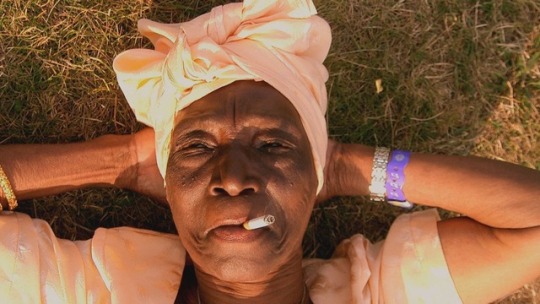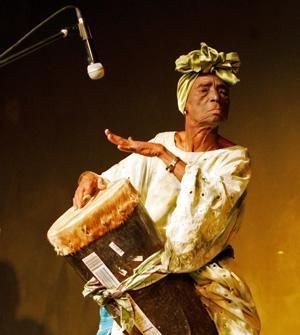#Bi Kidude
Text
1996 - Wanted to reblog this from @soundgrammar (2014) but it wouldn't let me. So here it is. The Queen of Taarab, Bi Kidude.
3 notes
·
View notes
Text


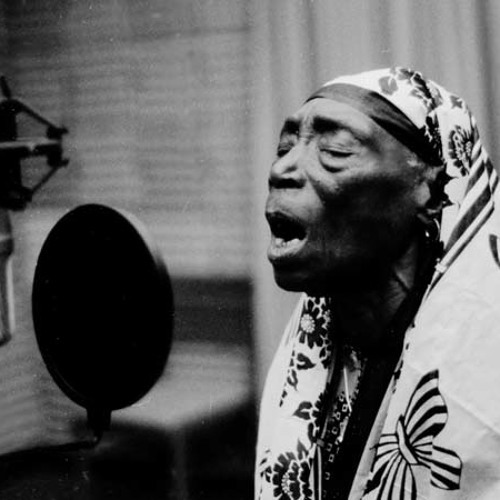
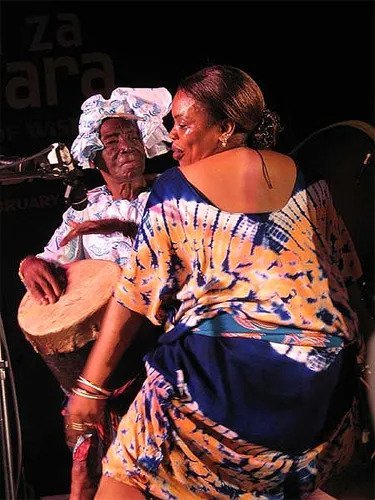
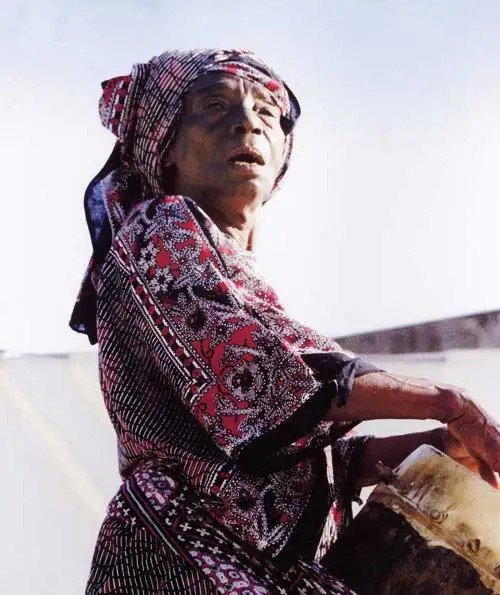
Bi Kidude
Bi Kidude was an institution in Zanzibar, and East Africa’s greatest musical legend. The diva of Zanzibar taarab, she also played other musical styles including more ngoma-based unyago and msondo.
Her real name has been described as Fatma Baraka Khamis or Bi Fatuma Binti Baraka. She grew up in a family of seven in the Zanzibari village of Mfagimarigo. Her father was a coconut seller.
Bi Kidude’s exact date of birth was unknown, much of her life story was uncorroborated, giving her an almost mythical status. Kidude started out her musical career in the 192s, and learned many of her songs with Siti bint Saad. She performed in countries all around Europe, Middle East and Japan and finally recorded her first solo album (Zanzibar, Retroafric Recordings) in 1994, while in her mid-eighties. She also released a second locally-produced album (Machozi ya Huba, Heartbeat Records) with her traditional drums influencing the burgeoning Zenji Flava local hip-hop scene in one of the most remarkable juxtapositions of musical style in modern World Music.
Since fleeing a forced marriage at the age of 13 and escaping her homeland of Zanzibar, Bi Kidude led an extraordinary and varied career as a drummer, singer, henna artist and natural healer. Her first journey was to the mainland of Tanzania, where she walked the length and breadth of the country barefoot.
With renewed confidence and a new attitude to tradition (by now Kidude had thrown off her veil and shaved her head!) she returned, slowly to Zanzibar where she acquired a small clay house in the 194s and settled down to life grounded in the traditional roots of society.
Bi Kidude was part of the Unyago movement, which prepares young Swahili women for their transition through puberty and excelled at the art of henna designing for young brides, manufacturing her own wanja application from age old recipes fit ‘to make a rainbow shine.’ Bi Kidude performed traditional unyago music and was the island’s leading exponent of this ancient dance ritual, performed exclusively for teenage girls, which uses traditional rhythms to teach women to pleasure their husbands, while lecturing against the dangers of sexual abuse and oppression.
Her many talents were acknowledged by Zanzibar International Film Festival (ZIFF) at the second Festival of the Dhow Countries in 1999, when she was awarded Lifetime Achievement Award for Contribution to the Arts.
Bi Kidude’s is a remarkable story, one which challenges our perception of age, and of the role of women in Islam. She never conformed to the media stereotype of a Muslim woman ever since she removed her veil. To see a ninety-something year old Muslim woman drink, smoke, flirt, dance and drum was a unique experience. To witness the transformation as she reversed the aging process and changes from a wrinkled granny into a vital shining star was nothing short of revolutionary.
In the summer of 2004 Bi Kidude toured Europe with Zanzibar’s illustrious Culture Musical Club taarab orchestra. Midway through this tour, the whole of Zanzibar was thrown into shock and disarray when a rumor spread fast through the island that Bi Kidude had died. From the narrow streets of Stone Town to the bazaars of N’gambo and throughout the villages this was the only topic of conversation as the island rapidly acquired the atmosphere of mourning. This rumor continued to spread even long after the offices of Busara Promotions had disseminated confirmation from Bi Kidude’s European promoters that on the contrary, she was alive and very well. She was surprised to hear that people in Zanzibar think that she has died:
“Sijafa bado. Labda sababu watu hawajaonana nami sasa karibu mwezi. Lakini bado tunaendelea na safari na bado safari ndefu ya miezi miwili. Lakini sijambo, sina wasiwasi miye. Kuimba naimba na nguvu zote ambazo ninazo ili watu wafurahi.”
“I haven’t died yet. Maybe people are saying that because they haven’t seen me around for almost a month. But we are still continuing our tour which lasts for two more months. Me, I’m well, I have no problem. Me I sing with all my strength and continue to make people happy.”
Source: https://worldmusiccentral.org/
#Bi Kidude#Zanzibar#Tanzania#East Africa#African music#Taarab#Unyago#Fatima binti Baraka#Angel Romero
11 notes
·
View notes
Text
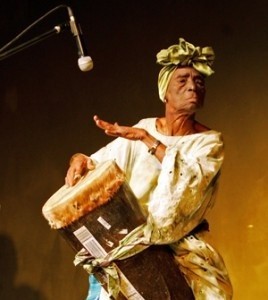
Continue resting peace Bi Kidude
7 notes
·
View notes
Text
youtube
Arab melodies from Zanzibar with the queen of Taarab, the 93 year old Bi Kidude
1 note
·
View note
Audio
Alaminadura // Bi Kidude
5 notes
·
View notes
Photo
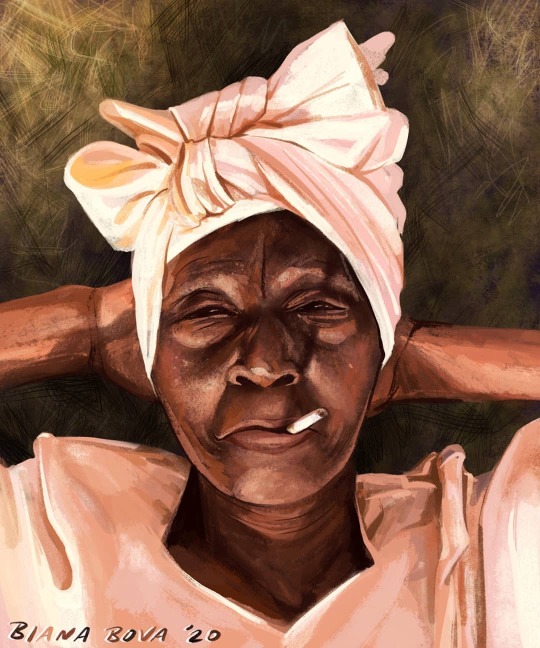
Practice painting of Zanzibari singer and legend Bi Kidude 🇹🇿 Swipe for reference pic! . "Fatuma binti Baraka (c.1910s – 17 April 2013), also known as Bi Kidude, was a Zanzibari-born Tanzanian Taarab singer. She has been called the "queen of Taarab and Unyago music" and was inspired by Siti binti Saad...Bi Kidude's exact date of birth is unknown and much of her life story is uncorroborated, but she was believed to be the oldest touring singer in the world before her death. In 2005, Bi Kidude received the WOMEX award for her contribution to music and culture in Zanzibar." #Wikipedia . "Along with the pioneering teenager Siti binti Saad (1880-1950), Bi Kidude was one of the first Zanzibari women to lift the veil and sing in public. This was a courageous move in a society where women were confined to purdah. The two were the first female communicators on the island and in mainland Tanzania, of which Zanzibar is now part....The women's messages were provocative, often ridiculing men's sexual behaviour and sometimes decrying the abuse of women." #TheGuardian . . #bikidude #fatumabikibaraka #illustratoroninstagram #illustrationdrawing #illustration #digitalartists #digitalart #digitalillustrator #digitalportrait #digitalpainting #digitalillustration #drawdigital #drawdaily #drawingoftheday #procreate #procreateartist #artstudiopro #freelanceillustrator #artsketch #womenillustrators #illustrationsketch #portraiture #digidraws #digitalartist #artistonig #instaart #instaartist #warmupsketch https://www.instagram.com/p/CHn03tnjoi6/?igshid=18n4ha91quc0u
#wikipedia#theguardian#bikidude#fatumabikibaraka#illustratoroninstagram#illustrationdrawing#illustration#digitalartists#digitalart#digitalillustrator#digitalportrait#digitalpainting#digitalillustration#drawdigital#drawdaily#drawingoftheday#procreate#procreateartist#artstudiopro#freelanceillustrator#artsketch#womenillustrators#illustrationsketch#portraiture#digidraws#digitalartist#artistonig#instaart#instaartist#warmupsketch
294 notes
·
View notes
Photo
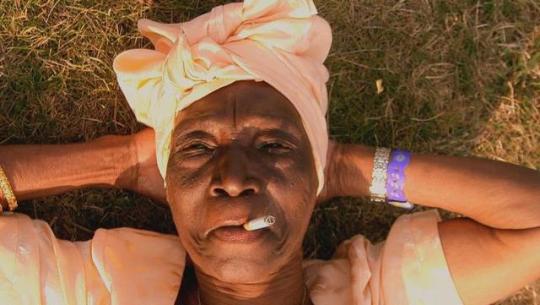
3.6.2017 “Bi Kidude na celowniku” w Kino Forum w ramach festiwalu AfryKamera
SZCZEGÓŁY TUTAJ
„Piję, palę i śpiewam” – mawiała Bi Kidude, uważana za najstarszą wokalistkę na świecie. Miała wtedy jakieś sto lat, może mniej, może więcej. Jedno pewne – im była starsza, tym sławniejsza i popularniejsza. I tym donośniej w pieśniach wybrzmiewał jej bunt przeciw nierównościom społecznym i opresji kobiet. Urodzona na Zanzibarze, w ubogiej rodzinie śpiewaczka spopularyzowała miejscową muzykę taarab i stała się nie tylko skarbem narodowym, ale i towarem eksportowym Tanzanii. A towar równa się pieniądze. O nie Bibi nigdy nie dbała – robili to inni. Prawdopodobnie sprawy finansowe doprowadziły do swoistego porwania "babci Zanzibaru" przez jednego z członków rodziny, który oskarżył wszystkie osoby z otoczenia artystki o wykorzystywanie jej, zaniedbywanie i okradanie.
Andy Jones, od lat zafascynowany postacią Kidude, autor pierwszego dokumentu poświęconego jej działalności, wraca na Zanzibar, aby przeprowadzić swego rodzaju śledztwo i wyjaśnić, co tak naprawdę się stało z Bibi. Nie zachowuje przy tym obiektywizmu dokumentalisty, ale osobiście angażuje się w pojednanie poróżnionych stron. A samotna, odizolowana Bi Kidude, pozbawiona tego, co najbardziej kocha – muzyki, ludzi i miasta – gaśnie w oczach.
tytuł polski: Bi Kidude na celowniku tytuł oryginalny: I Shot Bi Kidude reżyseria: Andy Jones czas trwania: 74' kraj produkcji: Wielka Brytania, Tanzania rok produkcji: 2015
[foto i opis materiały dystrybutora]
0 notes
Text
2 notes
·
View notes
Photo

Fatuma binti Baraka (c.1910s – 17 April 2013), Also known as Bi Kidude, was a Zanzibari-born Tanzanian Taarab singer. She has been called the "queen of Taarab and Unyago music" and was inspired by Siti binti Saad. Born in the village of Mfagimaringo, Bi Kidude was the daughter of a coconut seller in colonial Zanzibar. Bi Kidude's exact date of birth is unknown and much of her life story is uncorroborated. In 2005, Bi Kidude received the WOMEX award for her contribution to music and culture in Zanzibar. #musically #musicvideo #taarabu #taarabt #taarab #bikidudewanguu #bikidude #musician #musica #tanzanianweddings #tanzanian #visittanzania #tanzania🇹🇿 #prilaga #taarabacha #tanzania #music #bikidudebintbaraka😂😂😂 #zanzibarisland #zanzibar #taarabikini #zanzibarbeach #bikidudebintbaraka #traveldiarytz #dcmazanzibar #zanzibar2018 #zanzibarlife (at Dhow Countries Music Academy (DCMA)) https://www.instagram.com/p/Br6wQGxnXtW/?utm_source=ig_tumblr_share&igshid=obhkuvs0w974
#musically#musicvideo#taarabu#taarabt#taarab#bikidudewanguu#bikidude#musician#musica#tanzanianweddings#tanzanian#visittanzania#tanzania🇹🇿#prilaga#taarabacha#tanzania#music#bikidudebintbaraka😂😂😂#zanzibarisland#zanzibar#taarabikini#zanzibarbeach#bikidudebintbaraka#traveldiarytz#dcmazanzibar#zanzibar2018#zanzibarlife
1 note
·
View note
Photo
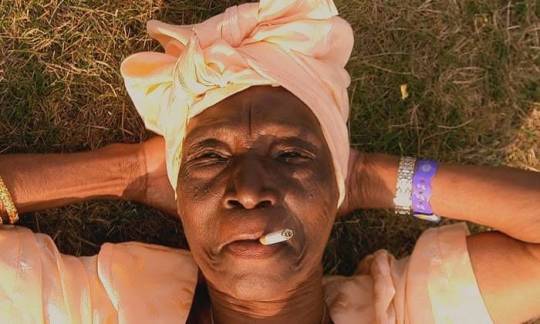
Fatuma binti Baraka, also known as Bi Kidude, was a Zanzibari-born Tanzanian Taarab singer. She has been called the "queen of Taarab and Unyago music" and was inspired by Siti binti Saad. Born in the village of Mfagimaringo, Bi Kidude was the daughter of a coconut seller in colonial Zanzibar. #Listen to #Zanzibar on #SoundCloud https://soundcloud.com/yaramekawei/zanzibar #linkinbio #Radio #broadcast #Radio_submarine #soundclould #African #music #africa #playlist #africanmusic #dance #podcast #afrobeats #follow #like #soundclould #africaeveryday #playlist #northafrica #afrococktail #afrodance #africandance #afropunk #afrobeat #bikidude https://www.instagram.com/p/CKoDTvNHpy0/?igshid=7oe4qt1sqpoa
#listen#zanzibar#soundcloud#linkinbio#radio#broadcast#radio_submarine#soundclould#african#music#africa#playlist#africanmusic#dance#podcast#afrobeats#follow#like#africaeveryday#northafrica#afrococktail#afrodance#africandance#afropunk#afrobeat#bikidude
0 notes
Video
youtube
Kijiti / Siti Muharam (On The Corner, 2020)
Tout a commencé par une triade de détails qui n’en sont pas: un disque qui vient de Zanzibar (le pays au nom le plus poétique et mystérieux au monde), une pochette aux allures d’affiche de film d’aventure(s) made in Bollywood et un morceau d’ouverture terrassant (“Machozi ya Huba”) comme une tempête tropicale. Autant dire que ce Siti of Unguja sentait la perle rare à plein nez. Bingo, c’est l’un des disques de musique traditionnelle les plus fascinants de ces derniers mois, voire plus.
Son but? Tenter de moderniser par petites touches cuivrées et synthétiques le Taarab, l’un des folklores les plus métissés de la planète: un étonnant patchwork d’éléments indiens (principalement mélodiques), arabes (des versets du Coran pour parole) et africains (la polyrythmie). Un peu comme si, pour le dire vite, Nusrat Fateh Ali Khan jammait avec Oum Kalthoum à la tombée de la nuit sur une plage de Tanzanie.
Il faut dire que Siti Muharam, l’autrice de cet exploit, a de qui tenir: sa grand-mère avait révolutionné le Taarab en son temps, il y a près d’un siècle. A une époque où les femmes n’avaient pas le droit de chanter en public, Siti Binti Saad avait fait bouger les lignes. Stylistiquement, elle a introduit une plus grande part d’improvisation, et philosophiquement, elle a ouvert la voie à d’autres femmes comme Bi Kidude ou Zuhura Swaleh.
Hypnotique et habité, Siti of Unguja réussit aussi sa romance revolution grâce à l’irruption d’un autre genre métissé au possible: le jazz. Sur “Nyuki” ou “Ashikibaya”, la clarinette de Tamar Osborn (la fondatrice du trop méconnu Collocutor) est franchement renversante de classe affaires. Et puis au-delà de son originalité et de son authenticité, ce disque est aussi et surtout un volcan d’émotions. Déchirante, la voix de Siti Muharam vous hantera la vie pendant des siècles et des siècles.
🇬🇧 It all started with a triad of details: a record that comes from Zanzibar (the country with the most poetic and mysterious name in the world), a cover that looks like an adventure film poster made in Bollywood and a crushing opening track (“Machozi ya Huba”) hitting us like a tropical storm. Enough to say that “Siti of Unguja” smelled like a rare gem and indeed, this is the most fascinating traditional music records we heard over the last months. Its goal? Trying to modernize the Taarab, one of the most mixed folklore on the planet: an astonishing patchwork of Indian (mainly melodic), Arabic (verses from the Koran as lyrics) and African elements (polyrhythm). (…) Hypnotic and inhabited, “Siti of Unguja” also succeeds in its romance revolution thanks to a cosmopolitan genre: jazz music. On “Nyuki” or “Ashikibaya”, Tamar Osborn’s clarinet (the founder of Collocutor) is downright stunning. Beyond its originality and authenticity, this record is also and above all a volcano of emotions. Siti Muharam’s heartbreaking voice will haunt your life for centuries and centuries.
#siti muharam#Kijiti#2020#on the corner#taarab#le gri-gri#affairesasuivre#affaires a suivre#world music
0 notes
Photo
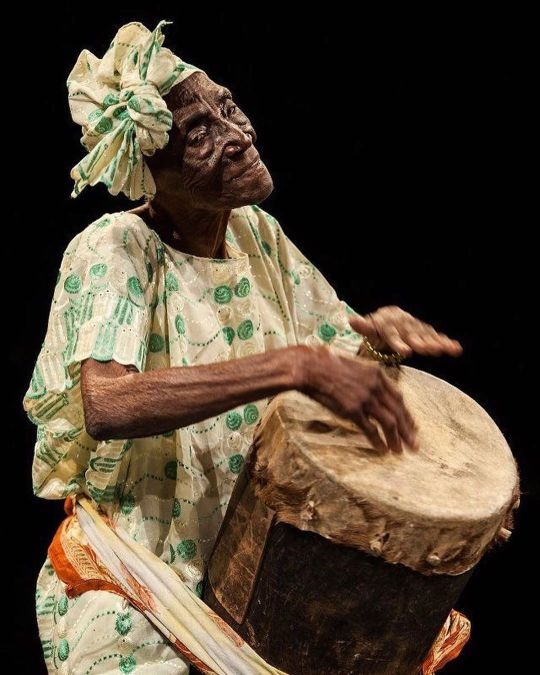
Reposted• @turbanistaparis Tanzanian Legend #bikidude (Fatuma binti Baraka)🕊 One of many amazing women who paved the way for generations of women. 🙏🏾 "The Zanzibari singer Bi Kidude (Kiswahili for "Little Granny"), who has died at the age of around 102, had a haunting voice and enigmatic stage presence. In the last 30 years she came to be widely recognised as one of the finest musicians from an island famous for spices and open to influences from the east. Along with the pioneering teenager Siti binti Saad, Bi Kidude was one of the first Zanzibari women to lift the veil and sing in public. This was a courageous move in a society where women were confined to purdah. The two were the first female communicators on the island and in mainland Tanzania, of which Zanzibar is now part. The women's messages were provocative, often ridiculing men's sexual behaviour and sometimes decrying the abuse of women. In 1928, Saad travelled to Bombay to make some of the earliest recordings by an African artist. Bi Kidude set out in the other direction, starting a marathon tour of east Africa. She travelled to the mainland by dhow and moved around occasionally by train, but mostly on foot. Following this journey of personal liberation, she returned home. She married but was unable to conceive and was divorced by two husbands. Then she moved into a small clay house in the Shangani quarter of Zanzibar town. She went to small taarab social clubs, usually run by women and, most importantly, became involved in unyago, the initiation procedure for Swahili women. The ritual washing and the social and sexual education that follow a girl's first menstruation are accompanied by traditional songs, drumming and dancing. This drumming ceremony is one of the rare occasions where African women play instruments. The unyago women discuss with their charges many issues that are otherwise taboo in African society. The climax of unyago ritual is the wedding, a colourful event at which Bi Kidude and her friends would play their drums and sing provocative songs to an audience of hundreds of women. She helped initiate so many girls over the years that she acquired the nickname “the guardian”. https://www.instagram.com/p/CDn84_zJ1h-/?igshid=146rn8kan4zem
0 notes

